No products in the cart.
Great news! The Canada Post strike is over! We’re resuming deliveries to Canada!
Excellente nouvelle ! La grève de Postes Canada est terminée ! Nous reprenons les livraisons vers le Canada !
Great news! The Canada Post strike is over! We’re resuming deliveries to Canada!
Excellente nouvelle ! La grève de Postes Canada est terminée ! Nous reprenons les livraisons vers le Canada !

Cetrine film-coated tablets 10 mg 20 pcs.
$17.89
Free Worldwide Shipping
Estimated delivery:
14 - 21 days
Categories: Allergy
Brand: Dr.Reddy's
Cetrine is an antihistamine used to treat symptoms of allergic reactions, such as runny nose, stuffy nose, red eyes, itching, and hives. It may also help with insect bites, atopic dermatitis, and other allergic conditions. Cetrine works by blocking the action of histamine, which is a substance that causes allergy symptoms. It is usually available in tablet form.
Composition and form of release
Active ingredient: cetirizine hydrochloride.
Composition
- 1 tablet contains cetirizine hydrochloride 10 mg;
- Excipients: lactose monohydrate; corn starch; povidone; magnesium stearate; hypromellose; polyethylene glycols; titanium dioxide (E 171); talc; sorbic acid; polysorbates; dimethicone.
Release form
Film-coated tablets.
Pharmacological properties
The active ingredient of Cetrine is Cetirizine – a competitive antagonist of histamine, a metabolite of hydroxyzine, blocks H1-histamine receptors. Prevents the development and facilitates the course of allergic reactions, has antipruritic and antiexudative properties, inhibits the development of the histamine-mediated early phase of the allergic reaction, limits the release of inflammatory mediators in the late stage of the allergic reaction, reduces the migration of eosinophils, neutrophils and basophils, reduces capillary permeability, prevents the development of tissue edema, relieves smooth muscle spasm. Eliminates the skin reaction to the introduction of histamine, specific allergens, as well as to cooling (with cold urticaria), reduces histamine-induced bronchoconstriction in mild bronchial asthma. Almost does not have anticholinergic and antiserotonin effects. In therapeutic doses, it has almost no sedative effect. The onset of action after a single dose of 10 mg of cetirizine occurs within 20 minutes in 50% of people and within 1 hour in 95% of people. The effect lasts for at least 24 hours after a single dose. With course therapy, tolerance to the antihistamine effect of cetirizine does not develop. After discontinuation of treatment, the effect persists for up to 3 days.
Indication
Nasal symptoms of seasonal and chronic allergic rhinitis (rhinorrhea, nasal itching, sneezing), non-nasal symptoms associated with conjunctivitis. Itching, urticaria of various types, including chronic idiopathic urticaria.
Contraindication
History of hypersensitivity to cetirizine, to any of the excipients, to hydroxyzine or to any piperazine derivatives. Severe renal impairment with creatinine clearance less than 10 ml/min.
Method of administration and doses
Take orally, regardless of meals, with sufficient liquid (1 glass).
Children aged 6 to 12 years: 5 mg (half a tablet) twice a day.
Adults and children over 12 years of age: 10 mg (1 tablet) once a day.
Elderly patients with normal renal function do not require dose adjustment.
For patients with impaired renal function, the dose should be adjusted on an individual basis, taking into account renal clearance, age and body weight.
Overdose
Overdose of cetirizine is mainly associated with effects on the CNS or with effects that may indicate anticholinergic activity. Side effects reported after taking a dose that exceeded at least 5 times the recommended daily dose include: confusion, diarrhea, dizziness, fatigue, headache, malaise, mydriasis, pruritus, restlessness, sedation, drowsiness, stupor, tachycardia, tremor and urinary retention.
At the initial stage, the patient should be induced to vomit. No antidote has been identified. Gastric lavage, administration of activated charcoal and laxatives are recommended. Dialysis is not effective. In severe cases, the functions of the cardiovascular and respiratory systems should be carefully monitored.
Special instructions
Use during pregnancy or breastfeeding
Pregnancy. There are insufficient data on the use of the drug during pregnancy. Animal studies do not indicate direct or indirect harmful effects on pregnancy, embryonal/fetal development, childbirth or postnatal development. Therefore, the drug should be prescribed to pregnant women only if, in the opinion of the doctor, the benefit of the use outweighs the potential risk to the fetus.
Breastfeeding. Cetirizine is excreted in breast milk in concentrations that are 25-90% of the plasma concentration, depending on the time elapsed after administration of the drug. Therefore, caution should be exercised when prescribing the drug to breastfeeding women.
Children
Cetirizine in tablet form is not prescribed for the treatment of children under 6 years of age, since this dosage form eliminates the necessary dose adjustment.
Ability to influence reaction speed when driving vehicles or other mechanisms
Persons who drive vehicles or work with complex mechanisms should use the drug with caution, taking into account the reaction of their own body. The therapeutic dose should not be exceeded.
Concomitant use of the drug with other CNS depressants may cause additional impairment of attention and impaired performance.
Composition of 1 tablet
Active ingredient – cetirizine hydrochloride – 10 mg
Auxiliary components: lactose monohydrate; corn starch; povidone; magnesium stearate; hypromellose; polyethylene glycols; titanium dioxide (E 171); talc; sorbic acid; polysorbates; dimethicone.
Storage conditions
Store in a dry, dark place out of reach of children at a temperature not exceeding 25 °C.
Shelf life – 2 years.
Do not use after the expiry date stated on the packaging.
Be the first to review “Cetrine film-coated tablets 10 mg 20 pcs.” Cancel reply

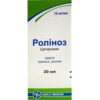
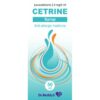
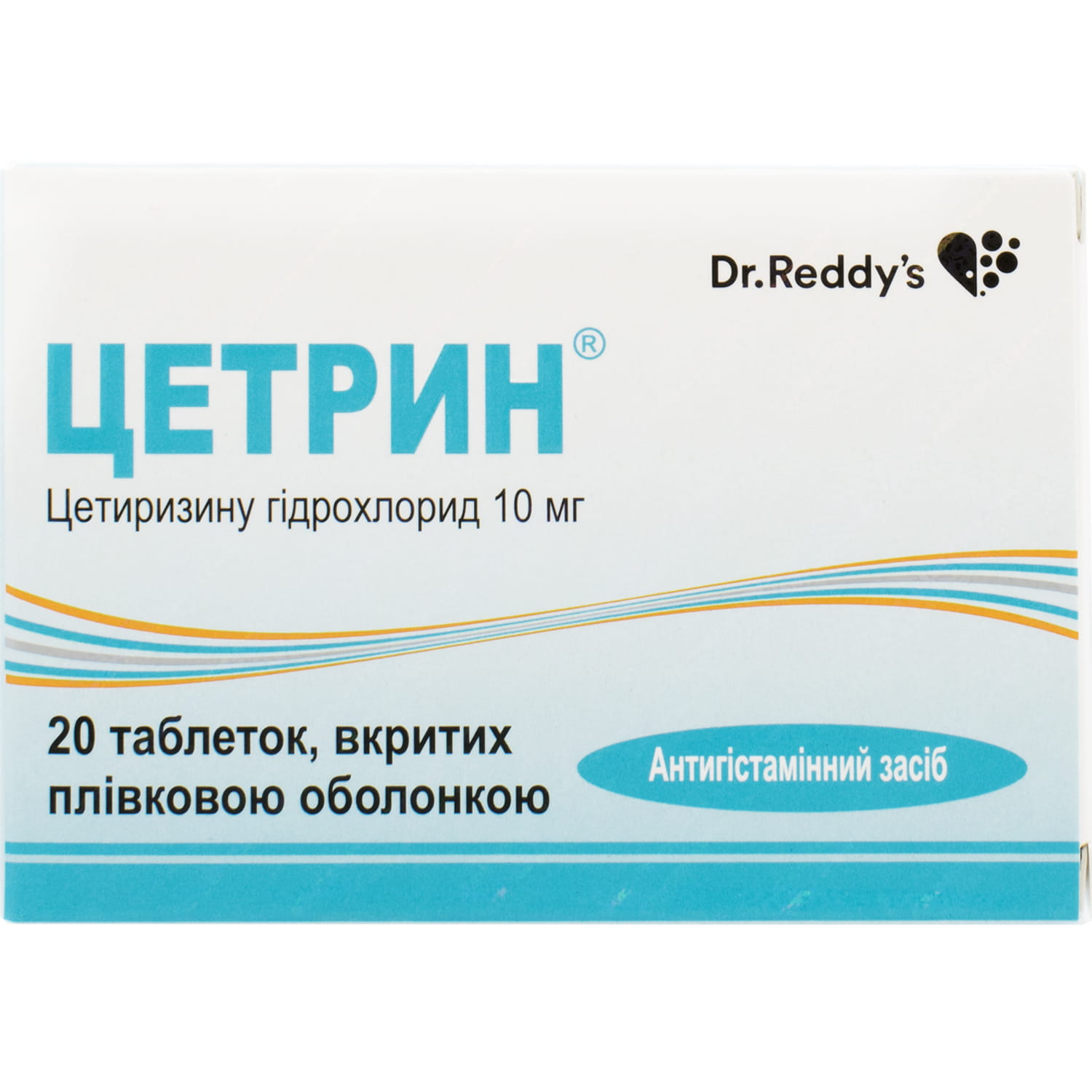
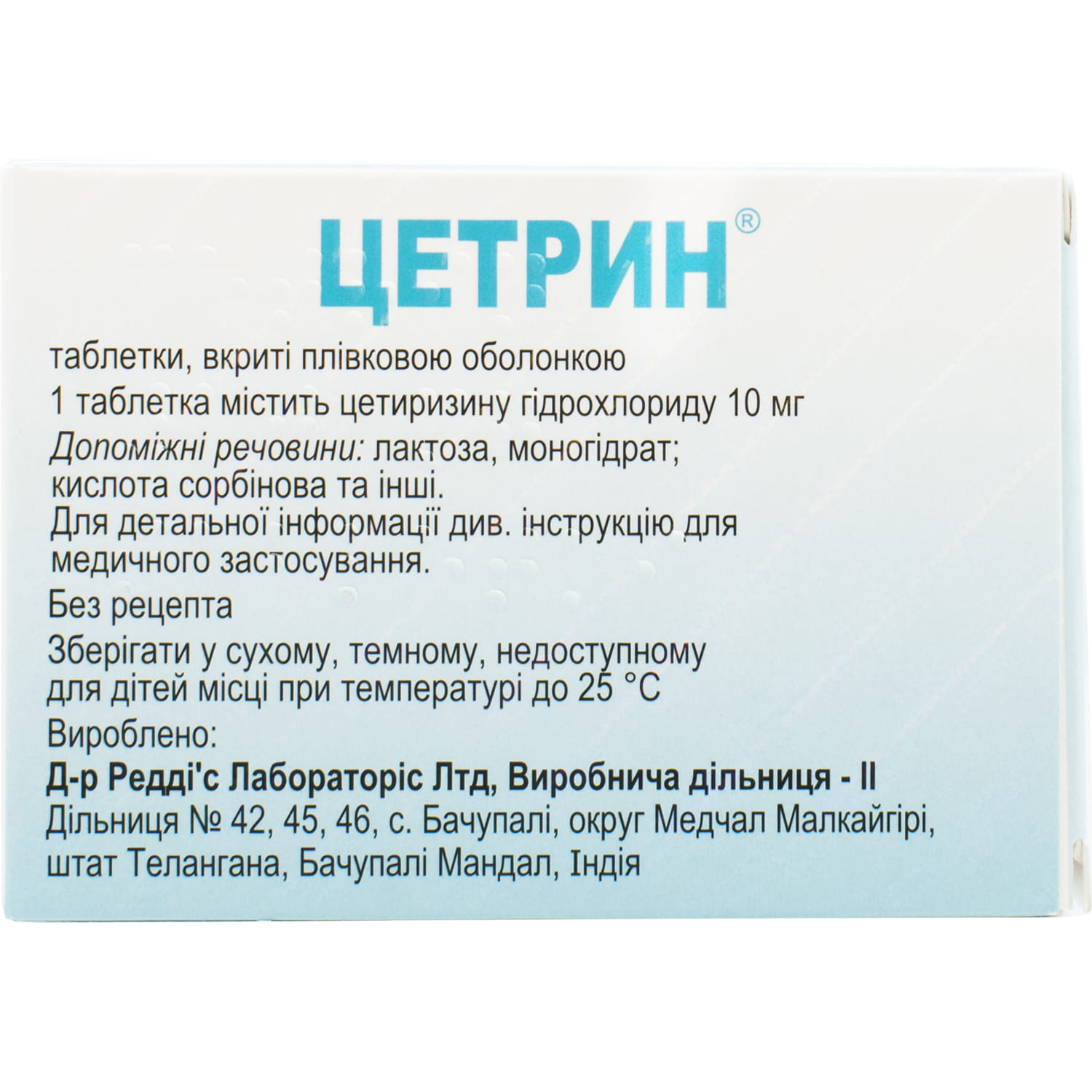

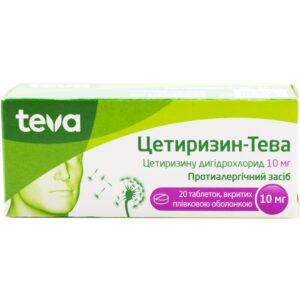
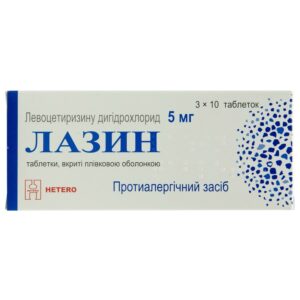
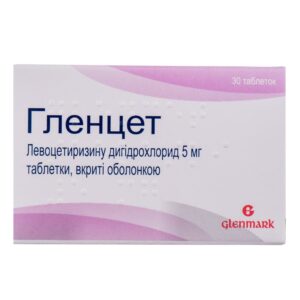
Reviews
There are no reviews yet.